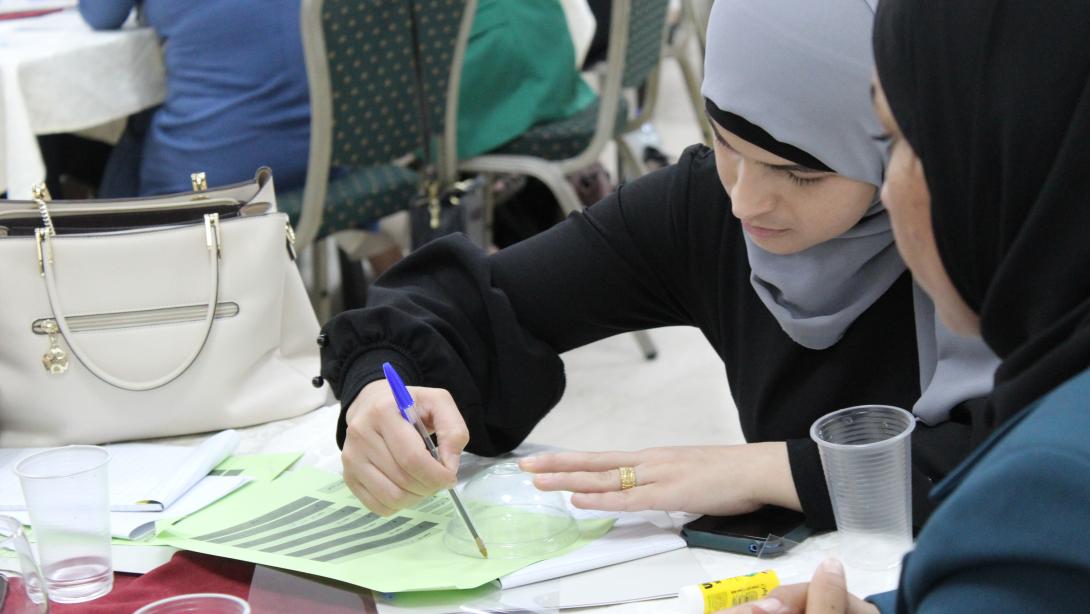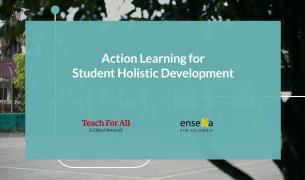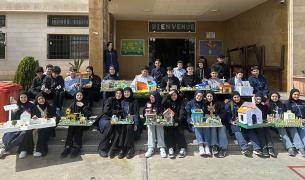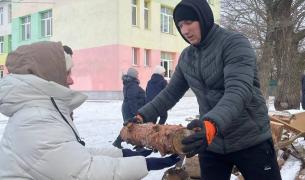Ensuring continuity of education amidst crisis: A Q&A with Teach For Palestine CEO Kholoud Salameh

Read this post in Arabic
On the International Day to Protect Education from Attack, Reem Marto, our Head of the Middle East and North Africa region, talked to Teach For Palestine CEO Kholoud Salameh about the ways in which the unprecedented education crisis has impacted how they support and prepare their teachers. In the West Bank, where Teach For Palestine operates, movement restrictions, escalating violence and military operations have resulted in the deaths of 67 students and injuries to 367 students in the last 10 months. We have been inspired by Teach For Palestine’s resilience in the face of these challenges and their efforts to ensure continuity of education are a reminder of the critical importance of protecting students’ right to education.
Reem Marto (RM): How did you prepare for the fellows' Summer Institute (4-week pre-service training) in light of escalating violence in the West Bank and what the International Court of Justice has called plausible risk of genocide in Gaza?
Kholoud Salameh (KS): In response to the ongoing challenges presented by the deteriorating security environment, we adopted a flexible and adaptive strategy for the execution of our first Summer Institute. The responsibility we felt extended beyond just facilitating their learning and capacity-building—it included ensuring their safety and security, which was a tremendous responsibility and kept us on edge throughout. This experience gave me a deeper appreciation for the immense pressure these fellows must feel when they return to their schools, not only nurturing their students' learning but also safeguarding their lives. It's hard to imagine the weight of such responsibility under these circumstances and how overwhelming it must be.
In the first few days of our Summer Institute, we encountered security incidents that forced us to postpone the training sessions. However, some fellows from Tulkarem and Hebron were already en route to us when we made that decision, as they had to travel through multiple military checkpoints and so had set out from home early in the day. We had to closely monitor the situation to ensure their safety, and maintained close communication with them until they arrived safely in Ramallah and then on their journey back to ensure they reached their homes without incident. It was an incredibly intense day, and as a result, we decided that going forward, all important communications would be sent by 6 a.m. to give everyone ample time to adjust their plans. We also acknowledged that situations could escalate during the training itself, requiring immediate action. We made provisions to be able to accommodate the trainees, should the situation prevent their travel back to their homes. To centralize communications and manage program-related safety and security concerns efficiently, we have also designated the Programs Manager as the security focal point who is responsible for sharing out all decisions and key information with participants if sessions had to be canceled or adjusted.
We are dedicated to ensuring that more children in Palestine do not lose further educational opportunities and although we are not currently operating within Gaza, we are committed to helping children in Gaza however we can as they face significant challenges that hinder access to their basic rights, including education. As such, we have partnered with the Harvard Graduate School of Education to organize three major workshops aimed at addressing the educational needs in Gaza and exploring effective responses to these challenges. We recognize the urgency of this situation, especially since it’s clear that the longer children stay out of school, the more difficult it is to catch up, with lasting consequences.
RM: How are you supporting your fellows to lead their classrooms and support their students when there is a threat of violence?
KS: To effectively equip our fellows with the necessary tools to lead during emergency situations, we conducted daily Psychosocial Support (PSS) sessions throughout our Summer Institute. These sessions were designed not only to help our fellows manage their own stress, but also to provide them with practical classroom activities to support student well-being. These activities included meditation, mindfulness and breathing exercises, as well as sessions focused on self-awareness and teamwork such as the “isolated island” exercise where participants are encouraged to roleplay and think through how they might work together to survive challenging situations.
In light of the ongoing violence across Palestine, we have developed a rigorous safety and contingency plan aimed at safeguarding our staff and teachers throughout the fellowship. This plan includes preparedness for transitioning teaching to hybrid or fully online when the security situation deteriorates to a point of needing to shelter indoors. We also offer a training program for school leaders and other teachers that aims to build a network of local leaders who can coordinate safety efforts and inspire collective action when threats arise. Our education supervisor also maintains daily contact with each fellow, providing continuous coaching and guidance and ensuring our fellows feel connected and confident, and that they are not alone in facing these challenges. We have created these plans in collaboration with all our teachers, prioritizing their safety above all else.
Additionally, we have established a dedicated WhatsApp group to facilitate seamless communication among team members. Regular discussions enable our fellows and staff to proactively identify and navigate challenges, reinforcing their sense of responsibility towards themselves and each other. This approach not only supports their personal growth but also strengthens our collective ability to achieve our goals.
At Teach For Palestine, our guiding principles of safety and to do no harm ensure that everyone within our organization operates in a secure environment. We believe that effective leadership involves empowering our teachers, staff members, and fellows to make decisions during emergency situations. Besides, the evaluation of these decisions is critical, as it provides valuable lessons and enhances our collective response to future emergencies. This approach not only strengthens our capacity for decision-making but also reinforces our commitment to safety and continuous improvement.
RM: Given the conflicts in the world right now that are generating a devastating impact on millions of children and families, do you have advice and insights for others across our global network related to protecting education from attack?
KS: Promoting tolerance, humanity, and inclusion plays a crucial role in protecting education from attack and fostering a safe and supportive learning environment. It is a fundamental belief of ours that if you do not raise children to prioritize tolerance and inclusivity then we will never be able to resolve conflict and differences. If we can instill these values from the get go, there is nothing to fear in the future. Additionally, advocating for adherence to international law and the right to education is essential to ensure that learning spaces remain safe and secure.
From our experience there are a few key strategies we have found helpful and, in the face of increasing global conflicts, we would recommend that educational organizations prioritize the the following:
-
Leveraging technology for continuity: Embrace technological solutions that enable the continuation of education during crises, for example by investing in e-learning platforms that can be rapidly deployed to ensure that education continues uninterrupted. Additionally, training educators to proficiently use these technologies will ensure that the transition to online learning is seamless when necessary.
-
Fostering community engagement: Building strong relationships with local communities can significantly enhance the protection of educational institutions. Community-based monitoring can provide early warnings about potential threats, allowing for quicker responses.
-
Implementing psychosocial support: Regular psychosocial support should be integrated into the school curriculum to help students and staff cope with the stresses caused by conflict. Training teachers in psychosocial first aid can also be incredibly beneficial, enabling them to provide immediate support to students in need.
-
Strengthening networks and partnerships: Collaborating with other organizations can enhance learning and resource sharing on best practices in educational safety. Networks can provide support and amplify efforts in advocacy, resource mobilization, and the implementation of innovative educational solutions during crises.
-
Preparing for adaptability: Ensure that all educational programming is designed with flexibility in mind, allowing for quick adaptation to changing circumstances. This includes having backup plans that can accommodate both in-person and remote learning scenarios.
As students return to school, the sound of laughter and smiles usually fills the air. Unfortunately, this is not the case in Palestine, where the return to school brings fear and tears instead. Many are left asking, “Why does this continue, and for how long?” As the situation continues to deteriorate, these are the strategies that we will continue to draw on and build upon in order to ensure as much normalcy for our teachers and their students as is possible in such abnormal times.


